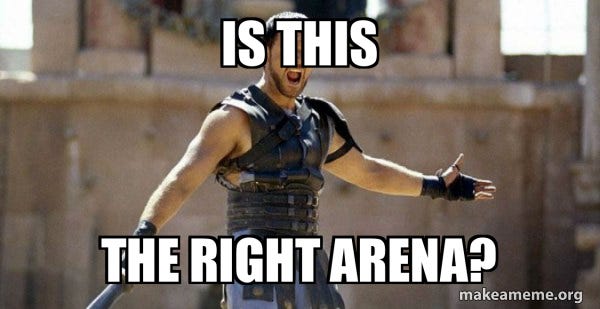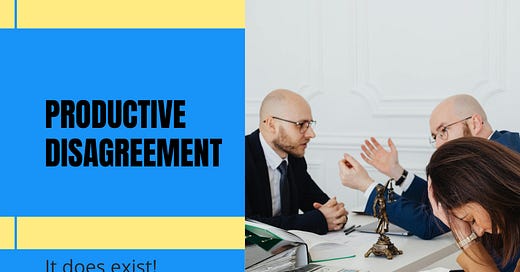Productive Disagreement Can Transform Conflict into Collaboration
Think of Puff Marshmallow Man.
You didn’t say ‘no’ and it was a huge mistake.
Sometimes we fail to follow our intuition and decide not to disagree. As a result, we end up with a terrible project, a politically tricky situation, or even a tolerated but not satisfying job.
“Oh well, if only I said ‘no’…”
You could save some stress and annoyance to yourself. Do it next time. Disagree when you actually disagree.
Understanding productive disagreement
Productive disagreement sounds a bit far-fetched and even negative. What it is in reality is a lot more subtle.
It is you expressing your ideas, thoughts, and opinions in conversations focusing on sharing arguments to resolve issues and nail the next steps, collaboration, project scope, team breakfast, children's homework, etc.
You have millions of such exchanges every day. But the real question is if you respect different viewpoints, listen actively, and are open to discussion and change.
Disagreements are not always personal. You may disagree with ideas but these ideas do not attack other person’s personality.
If you disagree with a solution, it does not mean you find the other person stupid. (Unless you give them such an impression, obviously).
The key is to create a fair arena for the exchange and respect for other opinions, agreed solutions, and reasons ‘why’ something is or is not possible.

Don’t take pleasure in destroying others with your arguments. Take it easy, buddy.
Challenges of productive disagreement
Three usual suspects hinder your discussions:
Emotions:
Stay aware of your emotions. You may notice when you feel good or bad. What triggers you? What stresses you? What prevents you from disagreeing or what hijacks you?
Likewise, notice how others react and read how they feel. Productive disagreement, like feedback, is never one way. You need everyone to be able to communicate.
Power play:
Like in ice hockey, there is a power imbalance in many cases. Leaders ensure that everyone feels heard and valued…or not. When a conflict arises, a neutral facilitator is often a good idea.
Either way, you should realize who holds the power and how they use it. Or how do you use it? Are you pushing everyone to agree with you? Do you act on your terms?
Personal and cultural differences:
Two people are not the same. There are as many variations in communication as there are people. Accepting others see it differently is a huge step in your communication skills.
They don’t see it like you do. They don’t like that idea like you do.
Expect differences and misunderstandings. Effective dialogue is a lot about creating conditions in which people can be different. Let them voice their opinions.
Strategies for engaging in productive disagreement
Disagreeing will be easier if you experiment with some of these:
1. Define rules
Every game has its rules. Communication can use some, too. Before engaging in a potentially heated discussion, agree on rules for respectful flow. They could be simple like no interrupting, avoiding personal attacks, and taking breaks if you’re going in a circle.
Rules support the quality of discussion. They do not silence it.
2. Focus on a problem, not a personality
Always keep the conversation focused on the topic. Don’t attack others with inappropriate comments about their personality, mistakes from the past, hair, etc.
Sarcasm is not your best friend when you are in the middle of a heated discussion.
Criticize ideas, not individuals.
3. Use “I” not “You”
A small twist but it makes so much difference.
Frame your points from your perspective. Avoid saying they, we, you. Using “you” often lands as defensiveness or it looks like you’re searching for a criminal.
“You never meet deadlines.” “You get offended easily.” “You are not responsible.”
For example, you can say instead:
“I am stressed when deadlines are missed.” “I hope this arrives as a suggestion.” “I feel concerned because I value responsibility.”
Shift the focus to your feelings and values rather than directly accusing the other person.
4. Common ground
I want you to be happy when the conversation is over. There is only one way to do it: common ground.
Find in which points you agree to build a foundation for resolving disagreements. It works like pure magic. When you see you agree on things, you start collaborating rather than opposing one another. Productive disagreement stands on collaboration, not on “winning”.
TL;DR
Productive disagreement transforms conflicts into opportunities for collaboration. Yes, you hear me right.
Replace scarecrow with something easy. Think of Puff Marshmallow Man. Something that will never destroy us (unless you’re a Ghostbuster). It is your choice.

Disagreements can lead to better outcomes and stronger relationships.
Bye for now! Ivona
On the menu:
Monday Case Study: Performance review that went down to the toilet.
Thursday Newsletter: Patience to listen
Upcoming training: July Feedback Boot Camp
2 sessions on feedback practice. Because you already know that feedback is a conversation. Now, get it done.
Dates: 16th & 23rd July
Duration: 85 Minutes/each session
Details: Dive into the key principles, SBI & Pendleton models, and master the art of handling emotional reactions easily, ensuring your feedback is heard and embraced.






